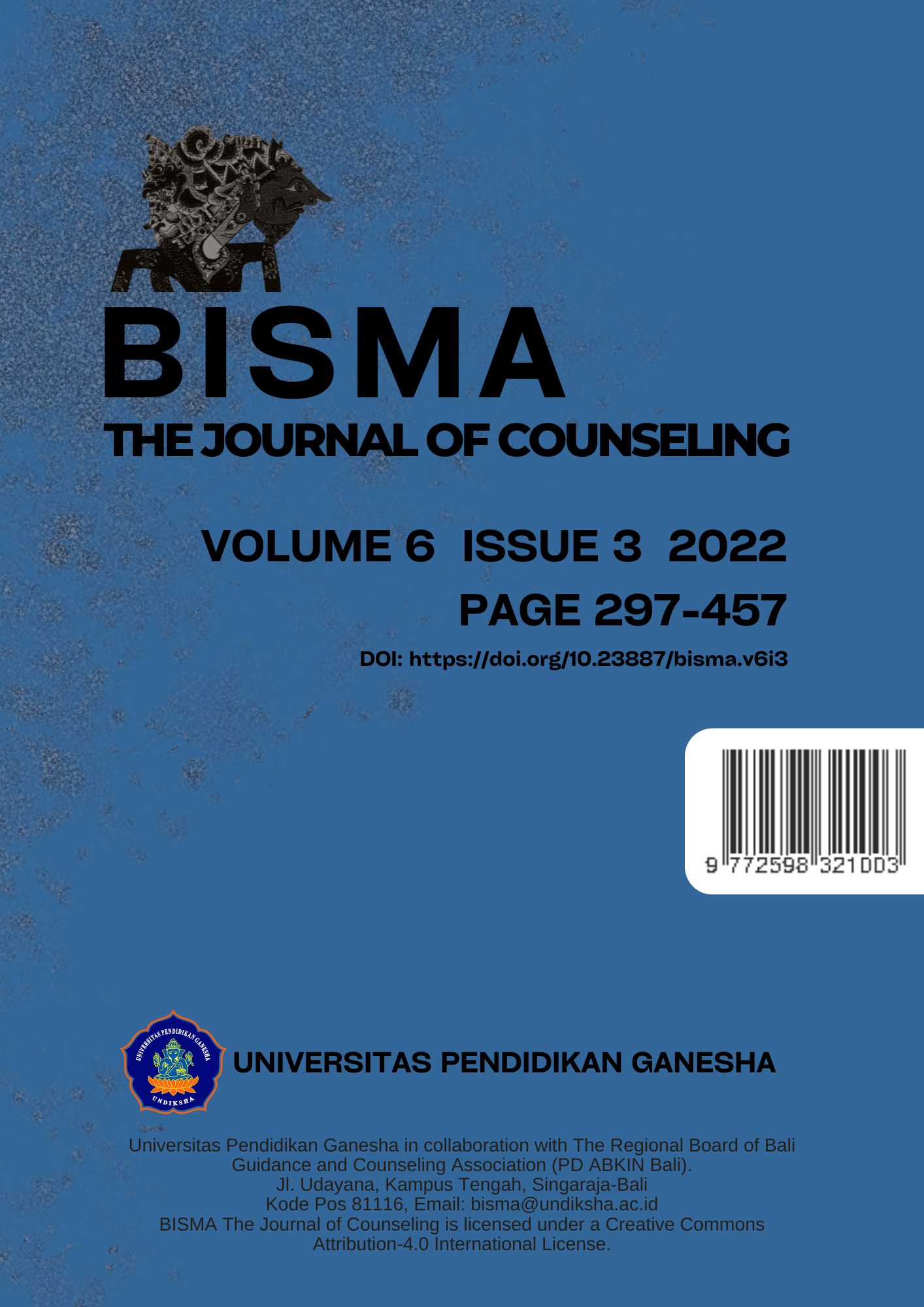How Do School Counselors Advocate for Gifted and Intelligent Children in Junior High School?
DOI:
https://doi.org/10.23887/bisma.v6i3.50671Keywords:
advocacy services, gifted, intelligent children, school counselorAbstract
This case study research attempts to 1) investigate in detail the provision of advocacy services carried out by counseling guidance teachers to gifted and intelligent students in junior high school, 2) know the collaboration between counseling guidance teachers with homeroom teachers and parents in dealing with obstacles in gifted and intelligent students. Referring to the findings in schools, there are two forms of advocacy services provided by counselors: holding academic conferences and collaborating with homeroom teachers for gifted and intelligent children. Meanwhile, to handle the problems of gifted, intelligent children in terms of learning, social, and career, the counselor collaborates with subject teachers to provide enrichment materials and participate in the Olympics. Then, with parents, arrange social activities for gifted, intelligent children. At the same time, at home, and periodically provide group guidance related to career planning. The results of this study can be used as evaluation material for schools and become an inspiration, especially for policymakers in counseling guidance to facilitate the rights of gifted and intelligent children.
References
Association, A. S. C. (n.d.). The ASCA national model: A framework for school counseling programs. 2003. Fairfax, VA: Author.
Callard-Szulgit, R. (2003). Perfectionism and gifted children. Scarecrow Education.
Christopher, M. M., & Shewmaker, J. (2010). The relationship of perfectionism to affective variables in gifted and highly able children. Gifted Child Today, 33(3), 20–30.
Colangelo, N., & Wood, S. M. (2015). Counseling the gifted: Past, present, and future directions. Journal of Counseling & Development, 93(2), 133-142. https://doi.org/10.1002/j.1556- 6676.2015.00189.x
Cross, J. R., & Cross, T. L. (2015). Clinical and mental health issues in counseling the gifted individual. Journal of Counseling and Development, 93(2), 163–172. https://doi.org/10.1002/j.1556-6676.2015.00192.x
Dahlia, H., & Roza, W. E. (2017). Masalah underachiever pada anak berbakat di sekolah. SCHOULID: Indonesian Journal of School Counseling, 2(2), 26–30.
Eva, N., & Bisri, M. (2018). Kesejahteraan Psikologis Siswa Cerdas Istimewa. Malang: Fakultas Pendidikan Psikologi Universitas Negeri Malang.
Fachrudin, Y. (2020). Penyelenggaraan Program Akselerasi Bagi Anak Berbakat di Smart Ekselensia Indonesia. Tarbawi: Jurnal pemikiran dan Pendidikan Islam, 3(3), 96–109.
Gantiny, T. P., Hendriana, H., & Suherman, M. M. (2020). Gambaran Underachiever Siswa Sekolah Menengah Pertama. FOKUS (Kajian Bimbingan & Konseling Dalam Pendidikan), 3(1), 33–39.
Gnilka, P. B., Ashby, J. S., & Noble, C. M. (2012). Multidimensional perfectionism and anxiety: Differences among individuals with perfectionism and tests of a coping-mediation model. Journal of Counseling and Development, 90(4), 427–436.
Greene, M. J. (2006). Helping Build Lives: Career and Life Development of Gifted and Talented Students. Professional School Counseling, 34–42. https://doi.org/10.1177/2156759x0601001s05
Harrison, C. (1995). Giftedness in early childhood. Sydney: Kindergarten Union Children’s Services.
Hidayati, R. (2016). Konseling Anak Dengan Keluarbiasaan Ganda. Jurnal psikologi Ilmiah, 2(2), 1–5.
Ifdil, I., Fadli, R. P., Zola, N., Putri, Y. E., & Amalianita, B. (2021). Layanan advokasi dalam bimbingan dan konseling. JRTI (Jurnal Riset Tindakan Indonesia), 6(2), 706–711.
Kennedy, K., & Farley, J. (2017). Counseling gifted students: School-based considerations and strategies. International Electronic Journal of Elementary Education, 10(3 Special Issue), 361–367. https://doi.org/10.26822/iejee.2018336194
Lisinus, R., & Sembiring, P. (2020). Pembinaan anak berkebutuhan khusus (sebuah perspektif bimbingan dan konseling). Yayasan Kita Menulis.
Miles, M. B., Huberman, A. M., & Saldaña, J. (2018). Qualitative data analysis: A methods sourcebook. Sage publications.
Mofield, E. L., & Peters, M. (2019). Understanding underachievement: Mindset, perfectionism, and achievement attitudes among gifted students. Journal for the Education of the Gifted, 42(2), 107–134. https://doi.org/10.1177/0162353219836737
Mofield, E. L., Peters, M., & Chakraborti-Ghosh, S. (2016). Perfectionism, coping, and underachievement in gifted adolescents: Avoidance vs. approach orientations. Education Sciences, 6(3), Article 21. https://doi.org/10.3390/educ- sci6030021
NAGC, N. A. for G. C. (2019). A Definition of Giftedness That Guides Best Practice. Position Statement. Washington, D.C.: NAGC.
POP BK SMA. (2016). Panduan Operasional Penyelenggaraan Bimbingan dan Konseling Sekolah Menengah Atas (SMA). Jakarta: Kementerian Pendidikan dan Kebudayaan Direktorat Jenderal Guru dan Tenaga Kependidikan.
Prayitno, P. (2012). Jenis Layanan dan Kegiatan Pendukung Konseling. Padang: Universitas Negeri Padang.
Rahmawati, R. (2013). Bimbingan dan Konseling Untuk Anak Underachiever. Jurnal Paradigma, 8(15), 1–24.
Reyes, M. E. S., Layno, K. J. T., Castañeda, J. R. E., Collantes, A. A., Sigua, M. A. D., & McCutcheon, L. E. (2015). Perfectionism and its relationship to the depressive feelings of gifted Filipino adolescents. North American Journal of Psychology, 17(2), 317–322.
Sunawan, S. (2016). Beberapa Bentuk Perilaku Underachievement dari Perspektif Teori Self Regulated Learning, 1–15. https://doi.org/10.17977/jip.v12i2.73.
Susiani, K. (2021). Maintenance Efforts of Bali Culture and Language Through Local Content in Primary Schools. Bisma The Journal of Counseling, 5(1), 9-15.
Syafrita, K. (2021). JENIS LAYANAN BK (LANJUTAN).
Syam, M. (2019). Analisis Perilaku Underachiever dan Implikasinya terhadap Bimbingan dan Konseling (Studi Kasus Pada Siswa SMP Negeri 8 di Makassar). Universitas Negeri Makassar.
Wood, S. (2010). Gifted Child Quarterly in Schools : What’s Really Happening ? Gifted Child Quarterly, 54(1), 42–58. https://doi.org/10.1177/0016986209352681
Yin, R. K. (2012). Case study methods. Sage.
Zeidner, M., & Shani-Zinovich, I. (2013). Research on personality and affective dispositions in gifted children: The Israeli scene. Gifted and Talented International, 28(1), 35–50.
Downloads
Published
Issue
Section
License
Copyright (c) 2022 Findivia Egga Fahruni, Ach. Sudrajad Nurismawan, Nabila Salma Salsabila

This work is licensed under a Creative Commons Attribution 4.0 International License.









